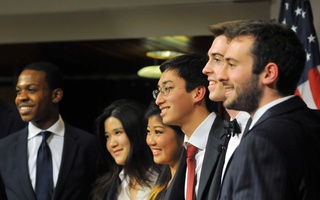{shortcode-3c58ab33994008f385a3173d82a2289772d98355}
UPDATED: Feb. 18, 2014, at 5:59 a.m.
In advance of their meeting with University President Drew G. Faust Thursday, leaders of the Undergraduate Council on Sunday outlined fundraising models and broke down the ways in which the would spend the additional $250,000 the organization is seeking from the University.
UC President Gus A. Mayopoulos '15, Vice President Sietse K. Goffard '15, and Student Relations Chair Ava Nasrollahzadeh '16 wrote in a press release to The Crimson Sunday that the requested increase, first announced Feb. 2, “stems from the rapid growth of student organizations and club sports.”
All three proposals that Mayopoulos and Goffard will present to Faust involve a term bill increase, they wrote.
The first would raise the student services free by $40 to a total of $115 per academic year, thereby increasing the UC’s annual budget by about $264,000, or more than 50 percent of its current budget of about $500,000.
A second method, which leaders dubbed the “sliding scales of justice” option, would raise the fee to $150, but students on financial aid would only pay a percentage of the total fee equal to the proportion of total tuition bill they pay.
The final option would peg the student activities charge to a percentage of the overall tuition, rather than increasing the fee by a specified amount, allowing for incremental scaled increases with inflation. According to the Council’s statement, that figure would ideally be .37 percent.
Harvard students currently pay $75 per academic year in the form of the student services fee that funds the Council and supports the grants it gives to student groups on campus.
As the number of student organizations has increased by 35 percent in the last 9 academic years, the UC leaders said that that fee, applied to each student’s term bill, has remained fixed.
“We are falling behind,” they wrote in the press release, noting that the average student activities fee at peer institutions is $169.
If they receive permission for the funding increase, the leaders said that the body would distribute 65 percent of the new funds to student groups and club sports. Fifteen percent of the funds would be set aside for House Committees and the Freshman Class Committee.
The remaining 20 percent would fund a broad variety of UC committee initiatives that subsidize events for students. Feedback from student surveys administered as part of Operation Ghost Protocol, the body’s new student outreach effort, would also play a part in the direction of this portion of the funds.
In a separate interview Sunday evening, Mayopoulos said that although he would prefer that additional UC funding come directly from the University, the prospects are historically low.
“We are trying to be as realistic as possible,” Mayopoulos said. “The only way the UC has ever been able to fund student co-curricular activities has been through the term bill.”
Read more in College News
Vigil Honors Lives of College Student and AlumnusRecommended Articles
-
 Three Tickets Face Off in UC Presidential Debate
Three Tickets Face Off in UC Presidential Debate -
 UC Will Meet With Smith To Request Increased Funding
UC Will Meet With Smith To Request Increased Funding -
Despite Support, Smith Says University Will Not Fund UC Budget Increase this YearFollowing a meeting Monday with Dean of the Faculty of Arts and Sciences Michael D. Smith, top Undergraduate Council leaders said that their request for a 50 percent increase in funding for student activities this year from the University was denied, even as Smith voiced support for their efforts and discussed funding possibilities for the future.
-
Council Begins Year with Concessions, New Goals for Student VoiceUndergraduate Council President Gus A. Mayopoulos '15 said it is unlikely that the body will secure more funding during his term.
-
 Undergraduate Student Activities Fee To Increase by Over 150 Percent
Undergraduate Student Activities Fee To Increase by Over 150 Percent













